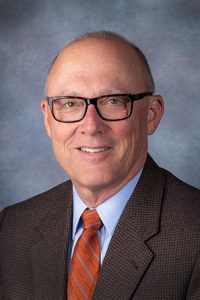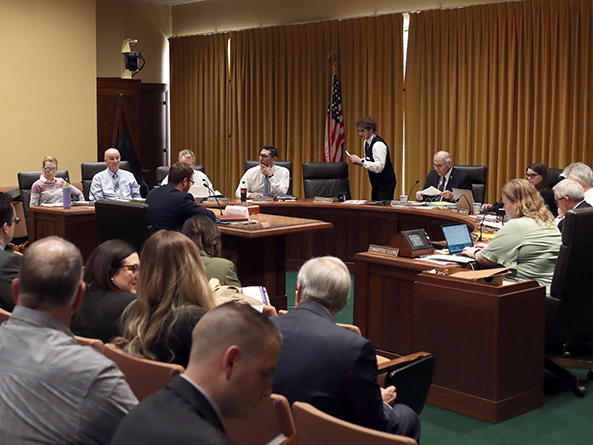Budget adjustments offered
Mid-biennium adjustments to the state’s budget were considered by the Appropriations Committee Jan. 30. The state budget is structured on a two-year basis, with the budget passed in odd-numbered years and adjustments made during legislative sessions held in even-numbered years.

Two bills, introduced by Speaker John Arch of La Vista at the request of Gov. Jim Pillen, comprise the governor’s mid-biennium budget recommendations. The committee heard joint testimony on the proposals.
LB1412 would provide, change and eliminate appropriations for operations of state government, postsecondary education, state aid, capital construction and federal funds allocated to Nebraska from the federal American Rescue Plan Act of 2021. LB1413 would transfer funds and create and change the use of funds.
The bills were presented to the committee by State Budget Administrator Lee Will, who said the goal of this year’s budget adjustments is “transformational” and “sustainable” property tax relief.
“Property taxes are driving Nebraskans who have worked here and raised their families out of their homes because they can’t afford their tax bill,” he said. “We can no longer strive to only slow down property tax increases, we must be bold and provide a 40% property tax reduction.”
Testimony focused on provisions in LB1413 that would transfer approximately $274 million from 31 different cash funds, revenue Will said is a “kick start” of revenue necessary to provide for property tax reform. He said almost every agency cash fund is “overbloated,” including some with balances equal to an entire year of operating costs.
“We have more than enough cushion to mitigate a recessionary blow,” Will said, adding that the governor’s complete budget package would result in a balance of $891.7 million in the state’s Cash Reserve Fund.
Several agency heads testified in support of the proposal, saying the cash fund transfers proposed in LB1413 would not impede their ability to serve Nebraska residents or complete ongoing projects.
Nebraska Commissioner of Labor John Albin said the proposed $60 million transfer from the State Unemployment Insurance Trust Fund would not impact its sustainability. The SUIT fund serves as an emergency state cash reserve fund to pay unemployment benefits if the federal government is ever unable to make those payments, Albin said, and currently has a balance of approximately $515 million.
That balance is 200% of the amount the department needed to cover unemployment benefits for Nebraska workers at the height of the Great Recession, he said, and nearly 150% of what was paid out during the worst point of the pandemic.
“The transfers proposed will not affect the ability of the Nebraska Department of Labor to administer the programs affected by the transfers,” Albin said.
Tom Riley, director of the state Department of Natural Resources, also testified in favor of the governor’s proposal, in spite of a provision in LB1413 that would remove $8.4 million from the Water Sustainability Fund allocated for an ongoing water project in Cedar and Knox counties.
Riley said the project has received other funds from a variety of state and federal sources and that a less expensive approach to the project has been identified.
Representatives of several agencies, boards and commissions that are not under the direct authority of the governor — as well as an array of nonprofit organizations and business interests — opposed the budget proposal.
Among them was Tim McCoy, director of the Nebraska Game and Parks Commission. McCoy said a proposed $9.5 million transfer from the commission’s cash fund would violate federal regulations and jeopardize millions in future federal funding.
In addition, he said, the agency cash fund is the repository of fees Nebraskans pay that are to be used “solely for the improvement, maintenance and operation” of state parks, not for property tax relief.
A proposed transfer of roughly $14 million from the Nebraska Universal Service Fund in LB1413 also raised objections. The fund is used to promote broadband and telecommunications services in rural and underserved parts of the state. Nebraska Public Service Commissioner Dan Watermeier testified in opposition to that transfer.
The NUSF balance has grown in recent years, he said, but that is the result of a PSC policy change that now pays out funds to providers on a reimbursement basis in order to ensure that new projects meet the commission’s standards.
“We believe this [policy] achieved the state goal of accountability, but the unintended consequence was the build up of funds as we wait to reimburse costs,” Watermeier said, adding that the proposed transfer would jeopardize important enhancements to the state’s telecommunications infrastructure.
Craig Beck of OpenSky Policy Institute also testified in opposition to the governor’s proposal, saying the cash fund transfers outlined in LB1413 are contrary to the way those funds have been treated in the past. The state currently has a projected budget surplus of more than $300 million, he said, which does not indicate a need for an influx of hundreds of millions from agency cash funds.
“From a historical lens, the last two times that a number of cash funds were transferred into the general fund to stabilize the budget [were] in 2009 and 2017,” Beck said. “And the fiscal outlooks in those times were substantially different — and worse — than they are now.”
The committee took no immediate action on the governor’s budget proposal.


